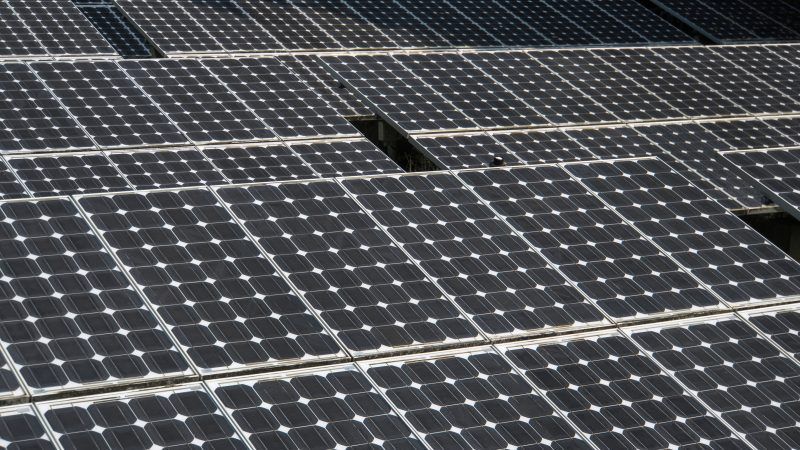Congress' Budget Deal Kills Solar Industry Tax Credits
The solar industry has benefited from "temporary" tax credits for decades. These might finally be allowed to lapse.

Despite intense lobbying from industry and Congressional Democrats, "temporary" federal tax credits for solar investment will at long last be allowed to lapse, marking one bright spot in a Congressional budget deal otherwise full of spending increases and special interest tax carveouts.
Since the 1970s, the federal government has given out a 10 percent tax credit to non-oil and gas energy investments, including solar. This investment tax credit program was always intended to be temporary but ended up being extended throughout the 1980s until finally being made permanent in 1992.
In 2005, Congress passed another "temporary" expansion of the investment tax credit for solar and geothermal energy, increasing it to 30 percent through 2007, but this too was extended again and again, most recently in 2015.
Current law had the tax credits for solar and geothermal energy falling to 26 percent in 2020, down to 21 percent in 2021. In 2022, the tax credit falls to a permanent 10 percent credit for commercial solar installations and is abolished completely for residential solar rigs.
In June, 20 Senate Democrats, including Sen. Diane Feinstein (D–Calif.), sent a letter to Senate leadership and the heads of the Senate Finance Committee asking for solar tax credits to be extended until Congress could pass comprehensive carbon reduction legislation.
In November, this was followed up in the House when Rep. Mike Thompson (D–Calif.) and other Democrats on the House Ways and Means Committee introduced the Growing Renewable Energy and Efficiency Now, or GREEN Act.
The bill, among other things, would extend the 30 percent solar tax credit out to 2024, where it would then zero out for non-business solar installations, and gradually fall to 10 percent by 2027 for commercial solar investments.
House Democrats were hoping to get their GREEN Act included as part of this year's budget deal, which is how an extension of the solar investment tax credit had managed to pass Congress in 2015. They came up short, however. This year's budget deal does not extend the expanded solar investment tax credit, sticking to the current schedule of falling down to 10 percent for businesses and zeroing out for residential installations.
A wind production tax credit, which was supposed to expire at the end of 2019, was extended for another year. As Reason's Eric Boehm noted yesterday, Congress' budget deal also gives a handout to biodiesel makers, who saw their own tax break expire in 2017. They will be now able to claim retroactive tax credits for the past two years, plus another two years of tax credits going forward.
This was not enough for many renewable energy groups.
"Congress let a crucial opportunity slip by, advancing a massive government spending bill without extending one of the most successful clean energy tax policies in history, the solar Investment Tax Credit," said Abigail Ross Hopper, president and CEO of the Solar Energy Industries Association (SEIA), in a press release.
The SEIA argues that the solar industry has seen phenomenal growth since the introduction of the 30 percent solar investment tax credit, and should, therefore, be preserved.
"We already know that the ITC has generated hundreds of thousands of jobs and injected more than $140 billion in private investment into the economy," said Hopper in a June press release. The SEIA's website claims the solar industry has experienced 52 percent annual growth thanks to federal tax credits.
This argument cuts both ways however: the stronger the solar industry becomes, the less of a case there is for giving it special treatment. This was the argument many industry analysts made back in 2015 when the tax credits were last up for debate: a tapering off of tax credits might slow the growth of the solar industry, but it wouldn't see it disappear.
Obviously, it would be better if Congress had gotten rid of the 10 percent permanent investment tax credit for solar, as well as the other renewable energy tax credits included in its budget deal.
It would be better still if subsidies to all energy production, including those to fossil fuels, were eliminated as well. A technology-neutral tax code with no special carveouts for anyone should be the goal. That the solar tax credits will finally expire is nevertheless a rare bit of sunshine.
Rent Free is a weekly newsletter from Christian Britschgi on urbanism and the fight for less regulation, more housing, more property rights, and more freedom in America's cities.

Show Comments (17)